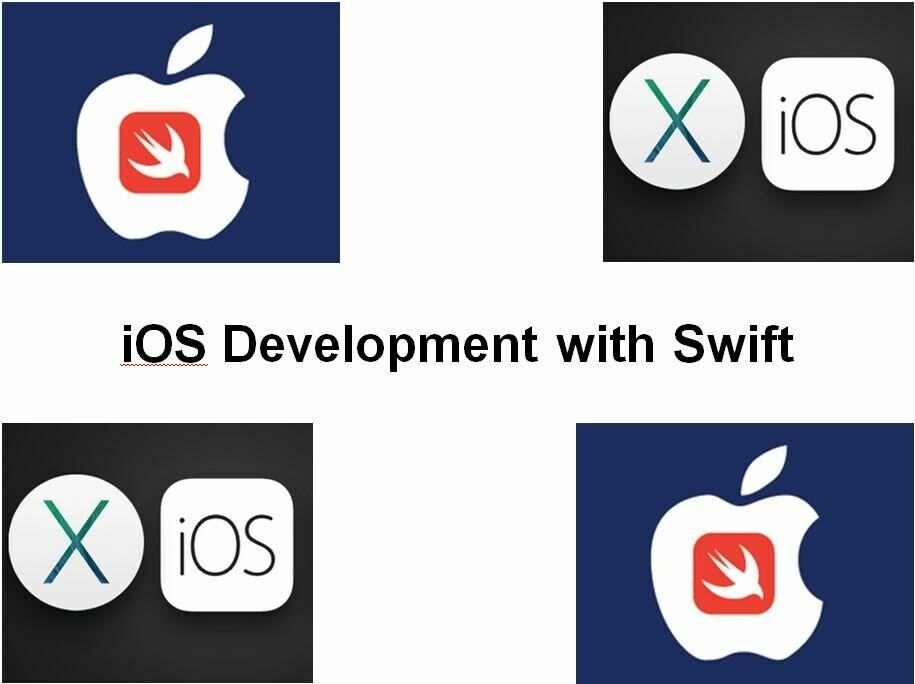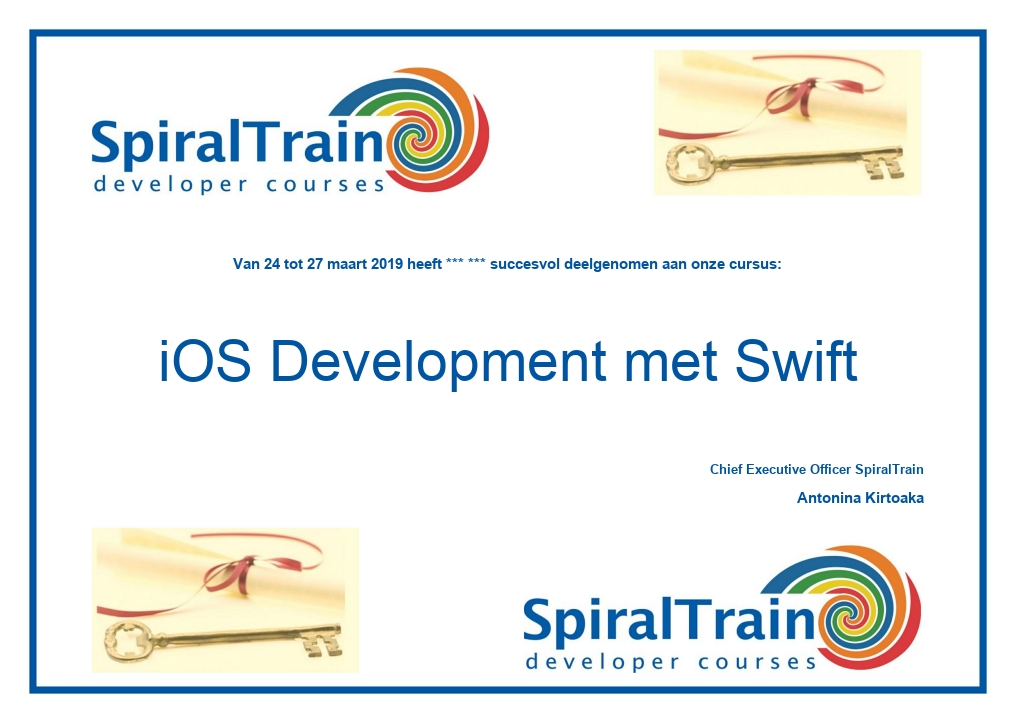- Leren door doen
- Trainers met praktijkervaring
- Klassikale trainingen
- Gedetailleerd cursusmateriaal
- Duidelijke inhoudsbeschrijving
- Maatwerk inhoud mogelijk
- Trainingen die doorgaan
- Kleine groepen
In de cursus iOS development met Swift leren de deelnemers de programmeer taal Swift te gebruiken voor de ontwikkeling van apps voor de iPhone en de iPad. Bij de ontwikkeling van iOS apps wordt gebruikt gemaakt van de XCode Development Environment waarvan de vele mogelijkheden in de cursus worden besproken.
De cursus iOS Development met Swift gaat van start met een bespreking van de iOS Architecture, de anatomie van iOS devices en de iOS SDK. Ook komen de Templates, Projects, Workspaces en Interface Builder van de XCode IDE aan de orde.
Na een overzicht van de essenties van de Swift programmeertaal wordt vervolgens aandacht besteed aan de Model View Controller architectuur van iOS apps. De koppeling van User Interface elementen met code via IBOutlets en IBActions komt dan ook aan de orde.
Views en controls zijn de visuele building blocks van het user interface van een iOS App. Diverse controls zoals buttons, switches, tables, date pickers en maps worden besproken. En ook views als Collection, Navigation en Tab Bar Views passeren de revu.
Daarnaast staat ook multitasking in iOS apps op het programma. Hierbij wordt ingegaan op Background Apps Refresh, State Restoration de Grand Central Dispatch (GCD) en Concurrency.
File System data access met Core Data en database access met SQLite is een belangrijk onderdeel van de cursus. En ook wordt ingegaan hoe kan worden omgegaan met XML en JSON data die binnen komen via HTTP networking en web service access.
Deelnemers leren eveneens gebruik te maken van storyboards voor UI ontwerp en onderzoeken teken technieken en animatie. Ook komt ook het debuggen van iPhone en iPad apps aan bod.
De cursus iOS development met Swift wordt afgesloten met aandacht voor deployment issues en localisatie van apps.
De cursus iOS Development met Swift is bedoeld voor developers die de taal Swift willen gebruiken voor de ontwikkeling van apps voor de iPhone en iPad.
Om aan de cursus iOS Development met Swift te kunnen deelnemen is enige voorkennis van programmeren in Objective C of Swift vereist.
De theorie wordt behandeld op basis van presentatie slides. Demos worden gebruikt om de theorie te verduidelijken. Er is ruime gelegenheid tot oefenen en theorie en exercise wisselen elkaar af. In de cursus wordt gewerkt met de nieuwste versie van iOS SDK, XCode en Interface Builder. De cursustijden zijn van 9.30 tot 16.30.
De deelnemers krijgen na het goed doorlopen van de cursus een officieel certificaat iOS Development met Swift.

Module 1 : Apps Intro |
Module 2 : Swift Overview |
Module 3 : App Architecture |
| XCode IDE Creating projects Templates, Projects, and Workspaces Creating a New Project LLVM and LLDB Debug Gauges Asset Management XCTest Testing Framework Anatomy of an iOS Device iOS Architecture Available SDKs Version Compatibility |
Constants Variables Data Types Collection Types Functions Closures Classes and Structures Automatic Reference Counting (ARC) Optionals Protocols Generics Objective-C Interoperability |
MVC architecture Model View Controller IBOutlets IBActions Subclassing Delegation Root View Controller Navigation Controller Controlling Stack Navigation Controller Communication |
Module 4 : UIControls |
Module 5 : Views |
Module 6 : Multitasking |
| Interface Builder Basic Interaction Buttons and Text Fields Sliders and Segments Switches Action sheets and Alerts Scrolling Image scrolling Zooming images Data Picker |
The View Hierarchy View behavior Containers and Controls Dynamic applications Collection views Grids Text and Web Views Navigation View Tab Bars Alert Views and Action Sheets |
Application States Background Execution Background App Refresh State Restoration Concurrency Grand Central Dispatch (GCD) Serial and Concurrent Queues Main Dispatch Queue Completion Blocks Operation Queues |
Module 7 : Advanced Controls |
Module 8 : Persistence |
Module 9 : RSS and JSON |
| Pickers Tables Customizing Tables Delegates DataSources Table View Styles Custom Cells Tab Bars Using MapKit Display Maps Navigate Locations |
Storing user preferences NSFileManager and NSFileHandle Pathnames in Swift Directories and Files Reading and Writing from a File Key-Value Data Using SQLite Directly Overview of Core Data Managed Objects Persistent Store Coordinator Retrieving and Modifying Data |
Reachability Synchronous Downloads Asynchronous Downloads Handling Timeouts Sending HTTP GET Requests Sending HTTP POST Requests Using RSS Using JSON Parsing JSON Parsing XML AirDrop |
Module 10 : Layouts and Storyboards |
Module 11 : Drawing and Animations |
Module 12 : Advanced Topics |
| Auto layout View Autosizing Handling screen size Handle rotation Size classes Split view controllers Controlling Rotation Behavior What are Storyboards? Adding Scenes Segues Transitions Using in a Tab Bar Application |
The Responder Chain Touch Notification Methods Respond to notifications Enabling Multitouch on the View Gesture Recognizers Core Graphics and Quartz 2D Lines, Paths, and Shapes Core Animation Blocks Transformations SpriteKit and SceneKit Physics Engine Adding Effects |
Targeting Multiple Devices iPhone vs. iPad Universal Apps Detecting Device Capabilities Supporting Multiple iOS Versions App Framework Support Implementing Handoff Localization and Resources Running on a Physical Device Development Certificates Assigning Devices Creating an App ID |
